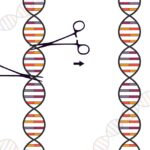What is CRISPR?
CRISPR stands for Clustered Regularly Interspaced Short Palindromic Repeats.
- It’s a special tool that allows scientists to cut and edit DNA (the instructions that tell cells what to do).
- Bacteria use CRISPR to remember virus attacks and fight them off in the future.
- Scientists borrowed this system to change DNA in plants, animals, and even humans!
How Does CRISPR Work?
CRISPR works like a GPS-guided pair of scissors!
- Scientists use a guide RNA molecule (like a GPS) to find the exact spot on DNA they want to change.
- An enzyme called Cas9 acts like scissors and cuts the DNA at that specific spot.
- After the cut, scientists can add, delete, or fix pieces of DNA to change how cells work.
- CRISPR could help fight diseases like cancer or genetic conditions in the future.
Practical Uses of CRISPR
CRISPR transforms research and medicine, helps fight diseases, improves crops, and better understand genetics.
Medical Treatments:
CRISPR is used in research to treat conditions like sickle cell anemia and muscular dystrophy.
Agriculture:
Developing crops resistant to pests, diseases, and harsh environmental conditions.
Research:
Identifying the role of specific genes in various biological processes.
Biotechnology:
Modifying organisms to produce biofuels more efficiently.
Fun Facts
Here are some interesting facts about CRISPR:
- CRISPR was discovered in 1987 by Japanese scientist Yoshizumi Ishino and his team.
- In 2020, scientists won the Nobel Prize in Chemistry for discovering CRISPR.
- Using CRISPR, researchers have edited out Huntington’s disease from mice.
- During the COVID-19 pandemic, CRISPR-based diagnostic tests provided rapid and accurate virus detection.
Review
Let’s quickly recap what we learned about CRISPR:
- What does CRISPR stand for? Clustered Regularly Interspaced Short Palindromic Repeats
- What does CRISPR do? Cut & Edit DNA
- What enzyme acts like scissors in CRISPR? Cas9
- Where was CRISPR found initially? Bacteria


Recent Comments